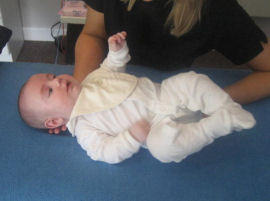Infant Sleeping Difficulties
 Sleep disorders in babies are many times different than the symptoms of an adult. That is why it is very important for parents and caregivers alike to be aware of this. Sleep disorders in babies are in fact incredibly common, and often appear to be related to central nervous system immaturity and therefore usually the baby grows out of it.
Sleep disorders in babies are many times different than the symptoms of an adult. That is why it is very important for parents and caregivers alike to be aware of this. Sleep disorders in babies are in fact incredibly common, and often appear to be related to central nervous system immaturity and therefore usually the baby grows out of it.When a baby or toddler comes to my clinic presenting with a sleep disorder, they are usually quite anxious, very alert, ‘jumpy‘, crying fractiously and completely exhausted. They tend to cling to their parents and generally do not like things placed on their head (hats/ hairband/clips etc).
The cause is usually a combination of factors:
- There may be retained moulding in the baby’s cranial bones. The baby may be uncomfortable with a constant feeling of pressure in the head, made worse by lying down.
- The Recticular Alarm System (RAS) is the system that alerts our bodies to danger and activates our flight or fight responses to that danger.
Often, when the baby has had a traumatic labour, delivery or post-delivery – especially with particular medical interventions such as vacuum, forceps or emergency c-section – their RAS may be activated and not able to switch off, even when the danger has passed. Tension is then felt in the whole body, especially affecting sleep, bowel and digestion functions.
Craniosacral Therapy works extremely well not only in calming down the RAS but helps to develop the immature nervous system. As the sessions begin, the baby may be cranky and ‘out of sorts’, but this progresses to a more content baby, developing sleeping and feeding patterns as the days go on.
Sleep Cycles
What do I need to know about sleep cycles?
When people sleep, they cycle between rapid eye movement (REM) sleep and non-rapid eye movement (NREM) sleep. In REM, your eyes move around fast, you don’t move your body much, and you dream. REM is light sleep and the stage when your infant or child is most likely to wake up. NREM sleep is deep sleep.
In normal sleep, a child cycles between light sleep and deep sleep. Each light sleep stage is a time when the child is more likely to wake up.
What do I need to know about how babies sleep?
Infants go through a complete sleep cycle about every 50-60 minutes, so they are in light sleep and could wake up many times each night!
Newborns just sleep any old time, on and off, all through the day and night. By age four months, your baby will probably be sleeping a 6-8 hour chunk at night, and by age 6 months, about 10-12 hours. But that’s not to say that they won’t wake up during that time! Most babies still wake up at least once a night even at age nine months. Some can get back to sleep by themselves, and some need you to help them fall back asleep.
